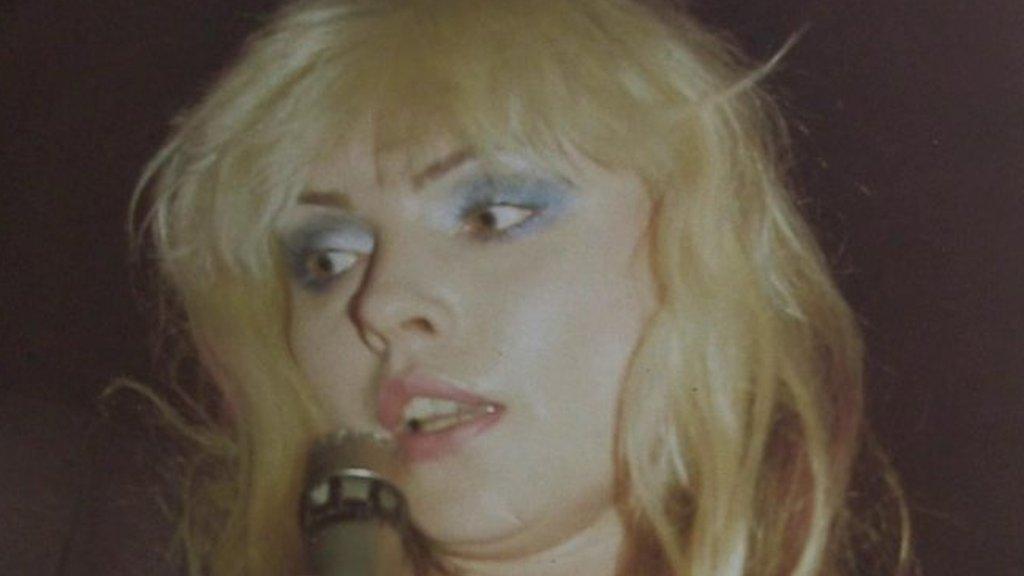Debbie Harry on Blondie's 'monumental' Cuba trip and her reunion demands
- Published
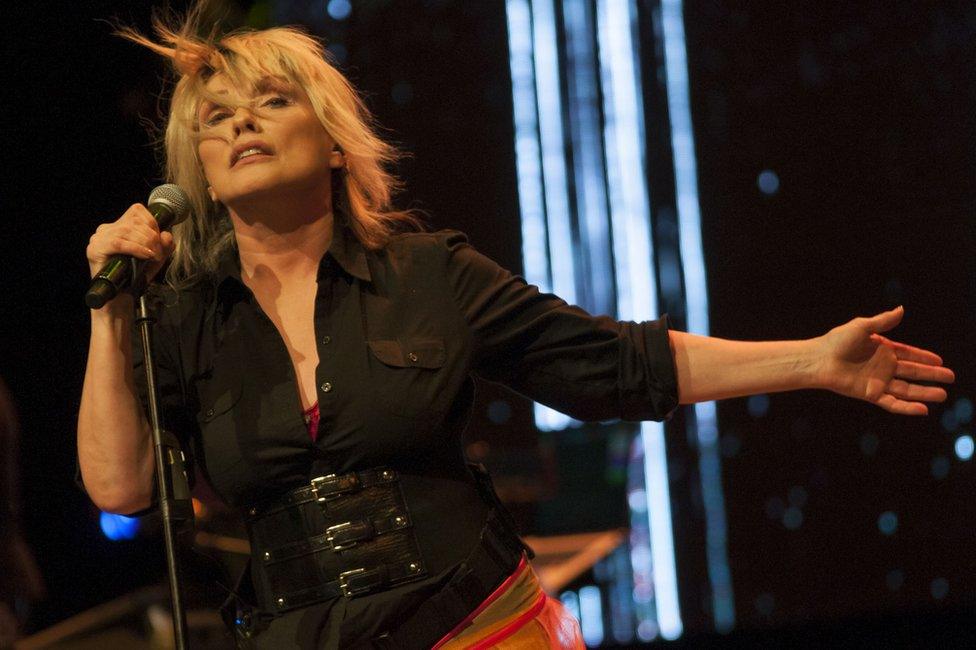
Debbie Harry on stage in Cuba in March 2019
"There are no second acts in American lives," wrote F Scott Fitzgerald. But he hadn't reckoned with Blondie.
The most successful band to emerge from New York's punk/new wave scene of the 1970s, they had six number one hits in the UK, including Heart Of Glass and Atomic, and sold 40 million records worldwide.
After six years touring the world, they disbanded in 1982, after guitarist Chris Stein was diagnosed with a near-fatal skin disease. Frontwoman Debbie Harry launched a part-time solo career while helping with his recovery.
Around the same time, Harry and Stein, who were a couple at the time, were hit with a huge bill for unpaid tax, the result of bad management, and lost their house. The IRS even took some of Harry's clothes to recoup the debt. They numbed the pain, both emotional and physical, with heroin.
For years, the idea of a Blondie reunion seemed impossible - but Harry was always a fighter. Adopted as a child, she survived being in a coma as a result of pneumonia, escaped an abusive relationship in her 20s, fled to New York, became a driver for the New York Dolls, worked as a BBC secretary and a Playboy Bunny (not at the same time), started a girl band, formed Blondie and even believes she had a lucky escape from the serial killer Ted Bundy.
So when Stein recovered in the 1990s and proposed putting Blondie back together, Harry would only agree on one condition.
"I made a demand," she recalls. "I said, 'I don't want to be in an oldies band.'
"The only way I would do it is if we were creative. I prefer looking to the future than looking at the past, so that was one of the basic principles I felt we had to have."
With that steely resolve, Harry turned Blondie's comeback from an epilogue into a vital new chapter.
The single Maria, external went straight to number one in 1999; and they've continued to make hits - Good Boys, Long Time - that sit comfortably alongside classics like Rapture and Picture This in their setlist.
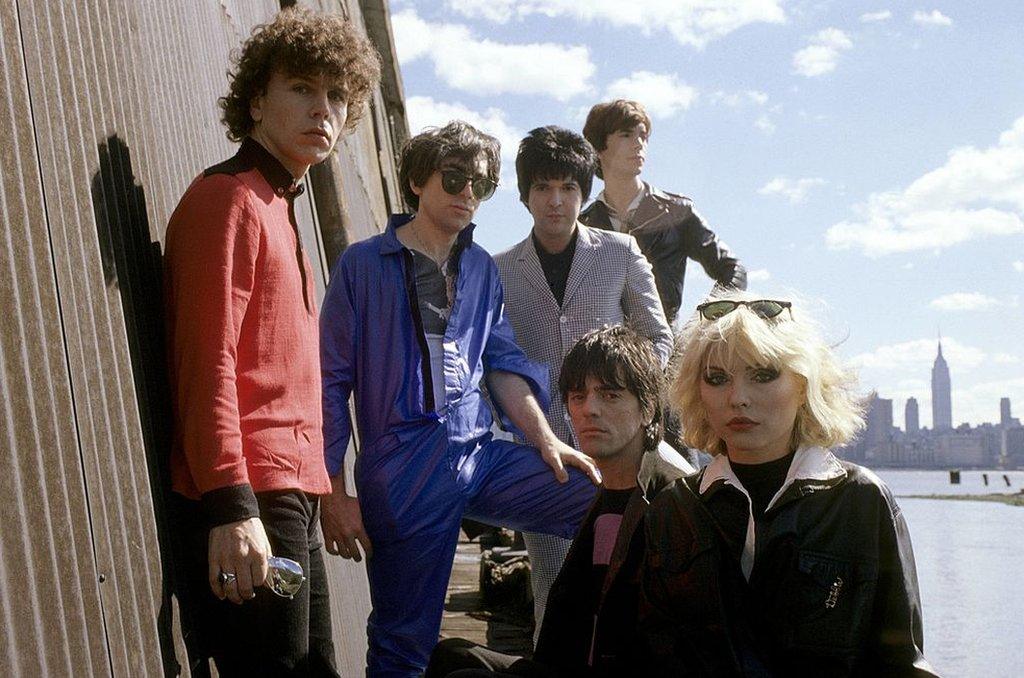
Blondie in 1979 (L-R): Nigel Harrison, Chris Stein, Clem Burke, Jimmy Destri, Frank Infante and Debbie Harry
Two years ago, they achieved another long-held ambition by playing two special gigs in Havana, Cuba.
Having long been fascinated by the country's music and architecture, the band seized the chance to visit the island as part of an official cultural exchange.
"I was just so eager and so happy to be there," Harry says. "I love the flavours. There was a very strong European design - the buildings were ornate and just quite beautiful, even though some of them were in a very bad condition."
In a short film documenting the concerts, the singer draws parallels between Havana's decaying tenements and the city where she made her name.
"In the 70s, New York was crumbling," she observes. "I think there's a kind of beauty in that decay and I think that was one of the similarities."
Asked if those environments inspire music, she pauses to reflect.
"I don't know... It's kind of what inspired us," she says. "But I think, in a way, chaos is a little bit more influential than just degrading buildings, you know?"
'Go beyond our best'
It's easy to see why Blondie felt an affinity for Cuba. Harry says Latin music "has always been part of the feel of New York". Latin rhythms drive Blondie songs like Rapture and Wipe Off My Sweat (largely sung in Spanish), while Peruvian percussionist Alex Acuña played on The Tide Is High.
The chance to work with Cuban musicians was a big selling point for the tour. Joining Blondie on stage were Cuban hall-of-famer Carlos Alfonso, with members of his 12-piece band Síntesis, pop singer David Torrens and salsa performer Alain Pérez.
Although they only had one day to rehearse, the musicians expanded and transformed Blondie's sound - with several songs teased out into nine-minute, semi-improvised island jams.
"I was so impressed with the Cuban musicians," says Harry. "These people were so talented, and they came into the sound-check totally prepared. Just their addition to songs was monumental."
Allow YouTube content?
This article contains content provided by Google YouTube. We ask for your permission before anything is loaded, as they may be using cookies and other technologies. You may want to read Google’s cookie policy, external and privacy policy, external before accepting. To view this content choose ‘accept and continue’.
The collaboration added an element of pressure to the gigs, however.
"I felt like I was in a very responsible position - and I don't know if I always feel that.
"I mean, I do have the responsibility of doing my best but, this time, I sort of felt that, 'Oh we've really got to go beyond our best.'"
In the end it worked out: the documentary captures Harry beaming from ear to ear as she floats above the harmonies of Ele Valdés and María del Carmen Ávila, and shimmying around the stage to the supple groove of Heart Of Glass.
"I really liked it when the girls were singing the harmonies and how fluid they were," she says. "The other thing I really enjoyed was the bongo and conga players, and how they lifted and accelerated the music. It was just so elementary."
Did she have any dreams of kidnapping the musicians and incorporating them into the band full time?
"Well," she drawls, "a couple of the conga players were really cute. So it would have been total incorporation!"
The biggest surprise, however, was that the audience in Havana's fabled art deco theatre Teatro Mella knew the songs - despite Cuban radio being off-limits to many Western artists during Fidel Castro's reign.
"From our perspective, they're not allowed to have contact with us - so you sort of wonder, 'Well, what are these people going to be like?' but everybody's so well-informed.
"There's really no way to stop radio waves or the internet. That's what the world is now: we are all of each other, as Sensei says."
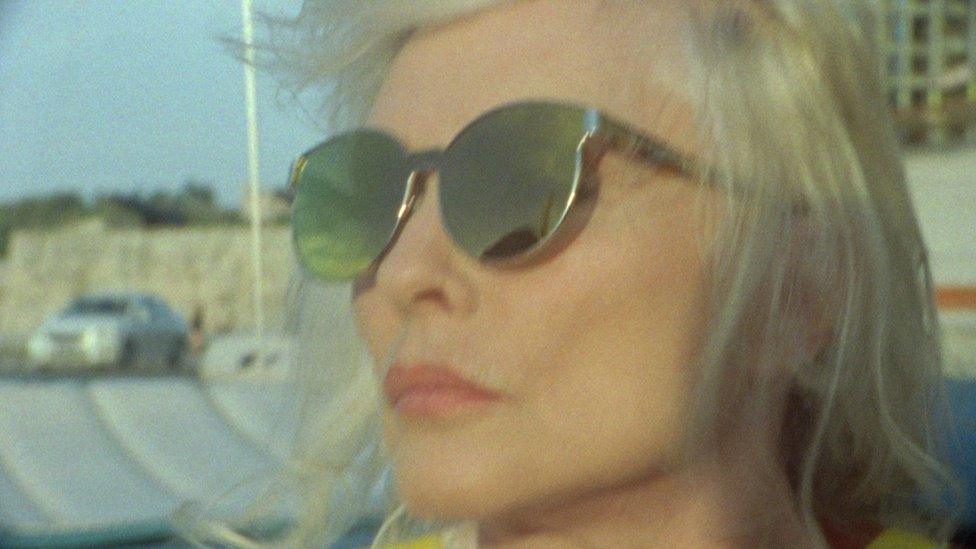
The singer also took the opportunity to explore the island, and visited some of the "small, scary" bunkers dating back to the Cuban Missile Crisis of 1962
Blondie's trip took place during a thaw in relations between the US and Cuba: Barack Obama had re-established diplomatic ties with the communist country in 2014, leading to an explosion in concerts by US artists.
But Blondie were among the last to visit, after the Trump administration imposed strict new rules on travelling to the island. Country star Tim McGraw, who'd been due to play a few weeks after Blondie, was among the artists who subsequently cancelled shows.
Harry is speaking to the BBC a few days before thousands of Cubans took to the streets protesting against power outages, food shortages and a lack of medicine - all of which President Miguel Díaz-Canel has blamed on the US trade embargo - but she recognises a crisis is looming.
"I just think it's inappropriate, that they should be embargoed like that," she says. "It just doesn't seem right to me at all, and it never really has.
"And honestly, after all the stuff that we've gone through in the past five years, I am dead sick of politics."
New releases and unheard demos
After a year in lockdown, Blondie are about to release a six-track EP collating the best moments of their Cuban adventure; while the 18-minute documentary, Blondie: Vivir En La Habana will premiere at the Sheffield Doc/Fest and the Tribeca Festival in June.
In the meantime, work has begun on the band's 12th studio album.
"It's at a very elementary stage," says Harry. "We've been assembling different tracks that we like. And I think the next step would be to get into rehearsals and make some [demos]. I think we're all kind of relieved that we can be in the same room with each other again."
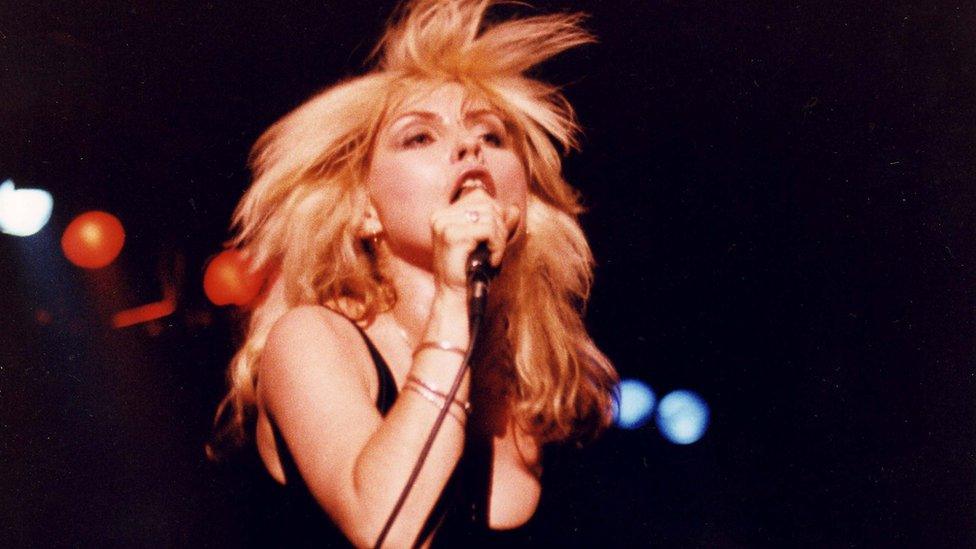
The band will celebrate their five-decade career with a box set of rare and unreleased material later this year
Unlike 2017's Pollinator, which featured contributions from Charli XCX, St Vincent and Johnny Marr, the album will be a "pure Blondie project" says the singer.
They're hoping to record 10 to 12 tracks with producer John Congleton (Phoebe Bridgers, St Vincent, Lana Del Rey) including covers of "some obscure tracks".
The latter is something of a Blondie speciality, with their covers of The Nerves' Hanging On The Telephone, external and Randy and the Rainbows' Denise, external generally accepted as the definitive versions.
Harry bats away that idea: "I guess history and detail is not everybody's forte." But, for someone who doesn't like looking to the past, she's become comfortable with celebrating Blondie's legacy.
The band are currently putting the finishing touches to their first archival box set, Blondie 1972-1984 Against The Odds, which will include iconic photos, historical essays and unreleased music.
Compiling the set has involved "a little bit of wailing and hair pulling", she confesses. "You're walking down deep dark paths of the past, and there's a lot of feelings there, like, 'Oh no, my God.'
"But some of it was very cute and some of it was surprisingly great."
And if all goes to plan, she'll be back in the UK this autumn for a joint tour with fellow pop rebels Garbage.
"I can't wait. I really miss being in the UK, so just the whole thing is a big tease for me. I just really can't wait for it to happen."

Follow us on Facebook, external, or on Twitter @BBCNewsEnts, external. If you have a story suggestion email entertainment.news@bbc.co.uk, external.
- Published5 August 2020
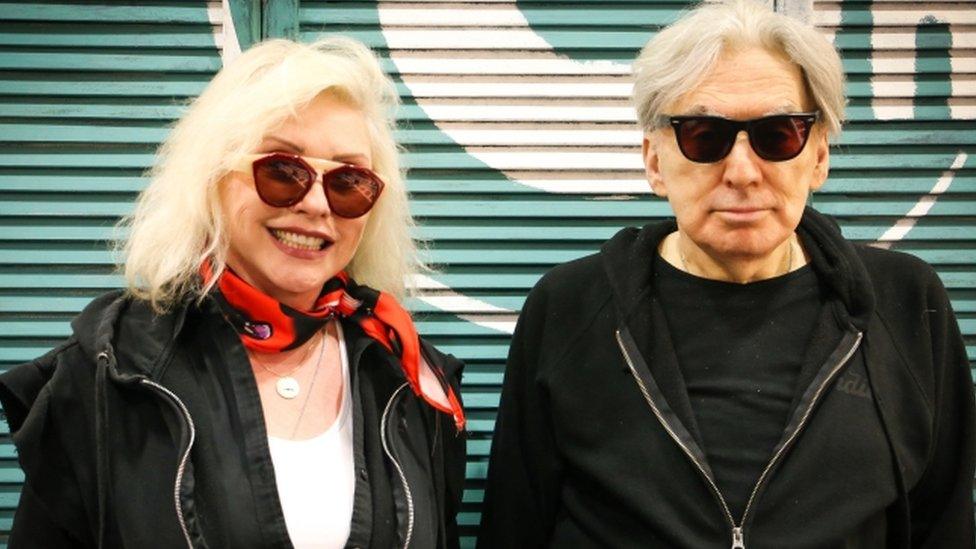
- Published1 May 2017
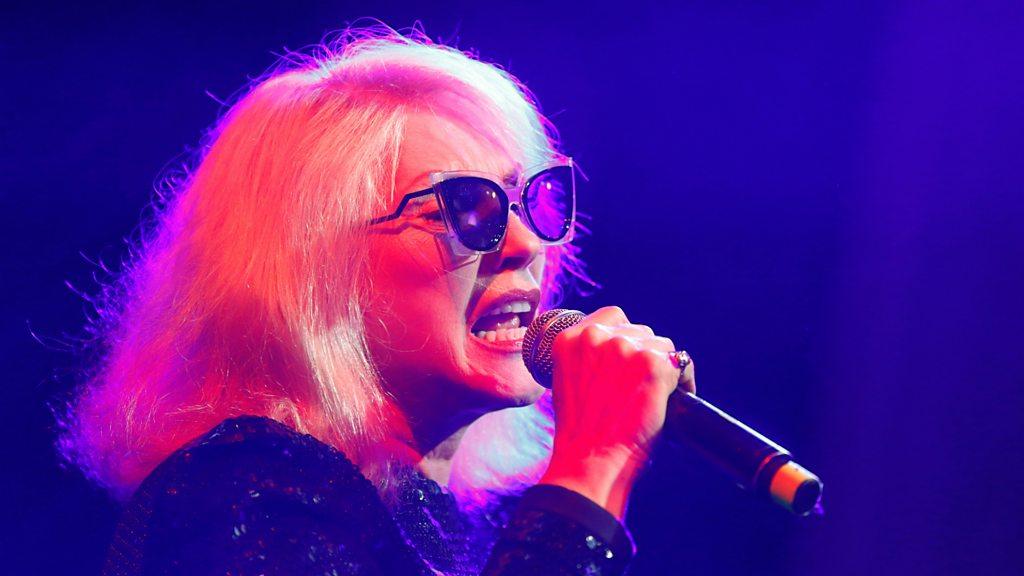
- Published19 May 2017
